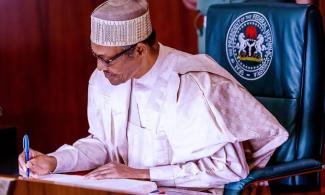
The appointment negated the criteria and procedure prescribed to protect the neutrality, objectivity and non-partisanship of INEC.
A coalition of eight civil society organisations has picked holes in the appointment of 19 Resident Electoral Commissioners of the Independent National Electoral Commission by the President Muhammadu Buhari government.
The civil societies called on the Senate to reject the nominees, who included four alleged members of the All Progressives Congress, saying the nomination violated the provisions of the 1999 Nigeria constitution as amended.
The Civil Society Organisations in a joint statement made available to SaharaReporters said that the appointment negated the criteria and procedure prescribed to protect the neutrality, objectivity and non-partisanship of INEC.
While the CSOs lamented the non-inclusion of the Persons With Disability (PWDs) in the appointment, they disclosed that out of the 14 new appointment, the nominees from States of Sokoto, Enugu, Imo and Ebonyi were either an APC political loyalists or were indicted for corruption in the past which they said breached the constitution on appointment of INEC Resident Electoral Commissioners.
The statement said, "To mention a few, Prof. Muhammad Lawal Bashir from Sokoto was a Governorship aspirant under the All Progressive Congress (APC) in the 2015 elections cycle. Mrs. Sylvia Uchenna Agu, the nominee for Enugu State, is believed to be the younger sister of the APC Deputy National Chairman, Southeast.
“The nominee for Imo State, Mrs. Pauline Onyeka Ugochi, a former Head of ICT at INEC in Imo state, gained notoriety for alleged corruption and connivance with politicians to undermine elections. Mrs. Queen Elizabeth Agwu, a former Accountant-General of the Ebonyi, was suspended allegedly on the grounds of incompetence and corruption in 2016.
"We contend that the appointment of these individuals as RECs will significantly undermine the neutrality and impartiality of the Independent National Electoral Commission, and it will increase mistrust in INEC and Nigeria's electoral process. By the combined effect of Section 156 (1)(a) and Third Schedule, Part 1, Item F, paragraph 14 (1), these individuals are constitutionally prohibited from any appointment as members of INEC. It will be against the sacred spirit of the Constitution to accept their nomination. Given their antecedent and close affinity with political parties, it is improbable that they will remain neutral and objective if successfully screened as INEC Resident Electoral Commissioners (REC)," they stated.
The Coalition also noted that the appointment didn't take into account the 35 per cent affirmative action for women, and insisted that it must be observed.
The statement added, “On July 26, 2022, the Nigerian Senate announced President Buhari's appointment of 19 Resident Electoral Commissioners (RECs) following the expiration of the tenure of the outgone RECs in nineteen states. Of the nineteen nominated RECs, fourteen were new appointments, while five were reappointed.
“The new nominees include Pauline Onyeka Ugochi (Imo); Muhammad Lawal Bashir (Sokoto); Prof. Ayobami Salami (Oyo); Zango Abdu (Katsina); Queen Elizabeth Agwu (Ebonyi); Agundu Tersoo (Benue), Yomere Oritsemlebi (Delta); Prof. Yahaya Ibrahim, (Kaduna); Dr. Nura Ali (Kano); Agu Uchenna Sylvia (Enugu); Ahmed Garki (FCT); Hudu Yunusa (Bauchi); Prof. Uzochukwu Chijioke, (Anambra); and Mohammed Nura (Yobe). The reappointed nominees include Ibrahim Abdullahi (Adamawa); Obo Effanga (Cross River); Umar Ibrahim (Taraba); Agboke Olaleke (Ogun); and Prof. Samuel Egwu.(Kogi).
The statement added, "Additionally, we are constrained to observe that the appointments did not reflect the principles of non-discrimination and inclusivity that the Civil Society Community has and continues to advocate, particularly, in this instant case, with regard to Persons with Disability (PWDs) who represent about 15% of Nigeria’s population and have been completely left out of the process. We submit that it is critical that as we strive to make the electoral process more inclusive, representative, and qualitative, the appointment of PWDS would provide the pulse required to give effect to the provisions of the Discrimination Against Persons Living with Disabilities Act, 2018, and other legislations and guiding principles in that regard.
"To this end, we, the undersigned, reject their appointment as RECs entirely and urge President Buhari to withdraw their nomination in the public interest and in furtherance of his commitment to leave a legacy of a truly independent electoral institution that enjoys the trust and confidence of citizens and electoral stakeholders.
"Also, we call for a thorough examination and background checks of the credentials of the nominees. The Senate is urged to reject these nominees that fall short of the threshold of non-partisanship and impeccable character. Electoral commissioners must be individuals with impeccable character, unquestionable neutral inclinations, dispositions, and competence. The nominations and process of confirmation must be inclusive and representative of all segments of the society.
"It is critical for the legitimacy and success of the 2023 general election that the appointment of the RECs is concluded expeditiously in a transparent, non-partisan, and professional manner, especially now that the 2023 election is in 183 days."
The statement was signed by Yiaga Africa, International Press Center, Center for Media and Society, The Albino Foundation Elect Her, Nigerian Women Trust Fund, Partners for Electoral Reform, Inclusive Friends Association and The Kukah Centre.